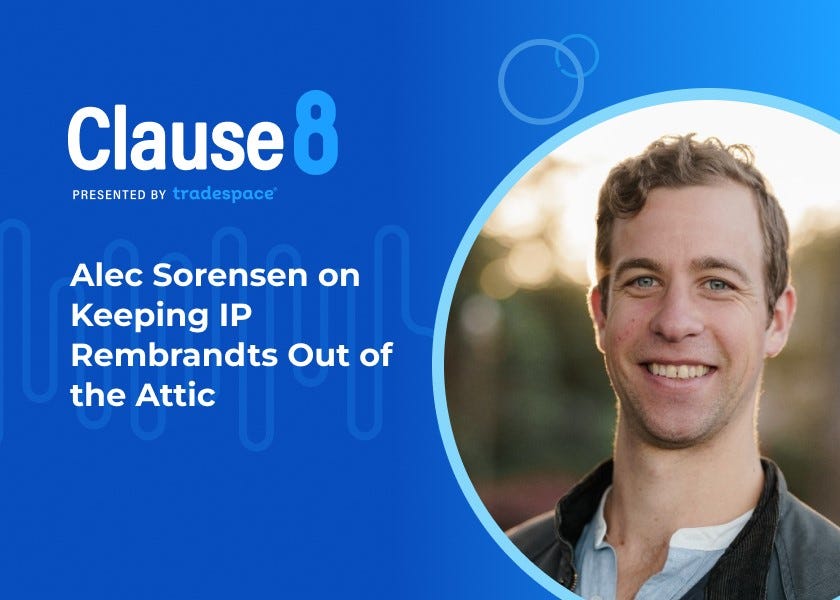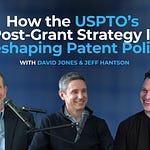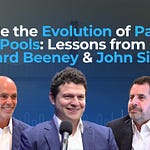What is the value of protecting intellectual property (IP)?
That’s the fundamental question Chief IP Counsel need time to answer to help their companies succeed. However, they’re often bogged down by the daily demands of leading teams that are doing what’s necessary to make sure that they’re obtaining the necessary IP protection. When they do have a chance to pose and answer that question to business executives, they quickly realize that those business executives are often concerned with more pressing issues. When they succeed and those business executives start getting excited about the potential value of protecting IP, in-house counsel has the added responsibility of making sure they can follow-through.
In this episode of Clause 8, Eli sits down with the founder & CEO of Tradespace, Alec Sorensen, to discuss potential strategies for in-house counsel facing these challenges. Alec talks about how he first discovered these challenges of in-house IP counsel while being asked to wade through messy IP portfolios of acquired companies as a management consultant. He explains how he was able to facilitate over $250 million in commercialization deals in that role and how that led him to found Tradespace to help in-house counsel set up their companies for similar success.
Eli and Alec explore the complexities of IP development and the potential to unlock hidden value in patent portfolios, how and when to communicate with the C-suite about IP, how IP teams can get other parts of the company become champions for its role, the role that commercialization plays for Tradespace tools, and much more!
Selected Topics
How lean, efficient IP teams are able to contribute to business success
IP team demands leading to lack of business relationships
Handling analysis paralysis in IP with analytics
Strategic IP questions for a new CEO
Successful IP strategies for universities
Role of AI in empowering IP decision-making
Risk of AI diminishing human judgement
Advice for tech entrepreneurs in the IP space
Customers using Tradespace to create better processes
Key Takeaways
Integration of IP with Business Strategy: IP teams need to align their patent portfolios with a company's product developments and strategic goals to highlight IP as a critical component of the business.
Leveraging AI in IP Management: Utilizing AI can help IP professionals map patent portfolios to products efficiently, enabling better strategic decisions and innovation tracking.
For effective IP commercialization, IP teams should work closely with corporate development and strategy functions within the company.
Institutionalizing Innovation: Companies can use patenting processes to capture and institutionalize their innovation efforts, making it a driving force for development and market competitiveness.
Tailoring Communication: When presenting IP strategies to C-suite executives or business leaders, focus on concise, impactful metrics tied directly to business outcomes and innovation goals.
Notable, Quotable
How IP Rembrandts end up in the attic
"It's not that business just doesn't think IP is important . . . Bcause of how it's developed today and how it's managed strategically, it's hard to find that value. And that's how those Rembrandts end up in the attic."
Strategy to start getting business excited about its patent portfolio
"Why not start by trying to compile that yourself? Essentially either using an AI model to look at your patent portfolio and try to map that to functional areas, or by using it to pull public information to say, okay, well let's build a list of all the publicly available products and SKUs and everything else we can see."
Key to building appreciation for protecting IP
"I think it's focusing on that North Star that's enabling your stakeholders to actually develop value and generate value from it."
How to successfully license IP
“I think it's probably not realistic to expect that any tool is going to change . . . [that] you still need to have somebody who's managing this process, who's building relationships with potential other parties.
The companies that have done this well have worked really closely with corporate development. So they found other stakeholders in the company whose job it is to go out and do deals, and they've brought them into the process and they've shown them that hey, if you can do this well, there are deals to be had. You can use tools, you can use metrics to show to a corp dev team this is why this IP portfolio is strong and this is why it's underutilized. And then this is why these ten companies are going to pay money for it. So now go out and see if you can package this.”
Genesis for Tradespace
“I think really the genesis for Tradespace was that you have this team that is so well positioned and could be so strategic within the company, and it ends up missing that opportunity because it doesn't have the right infrastructure.”










